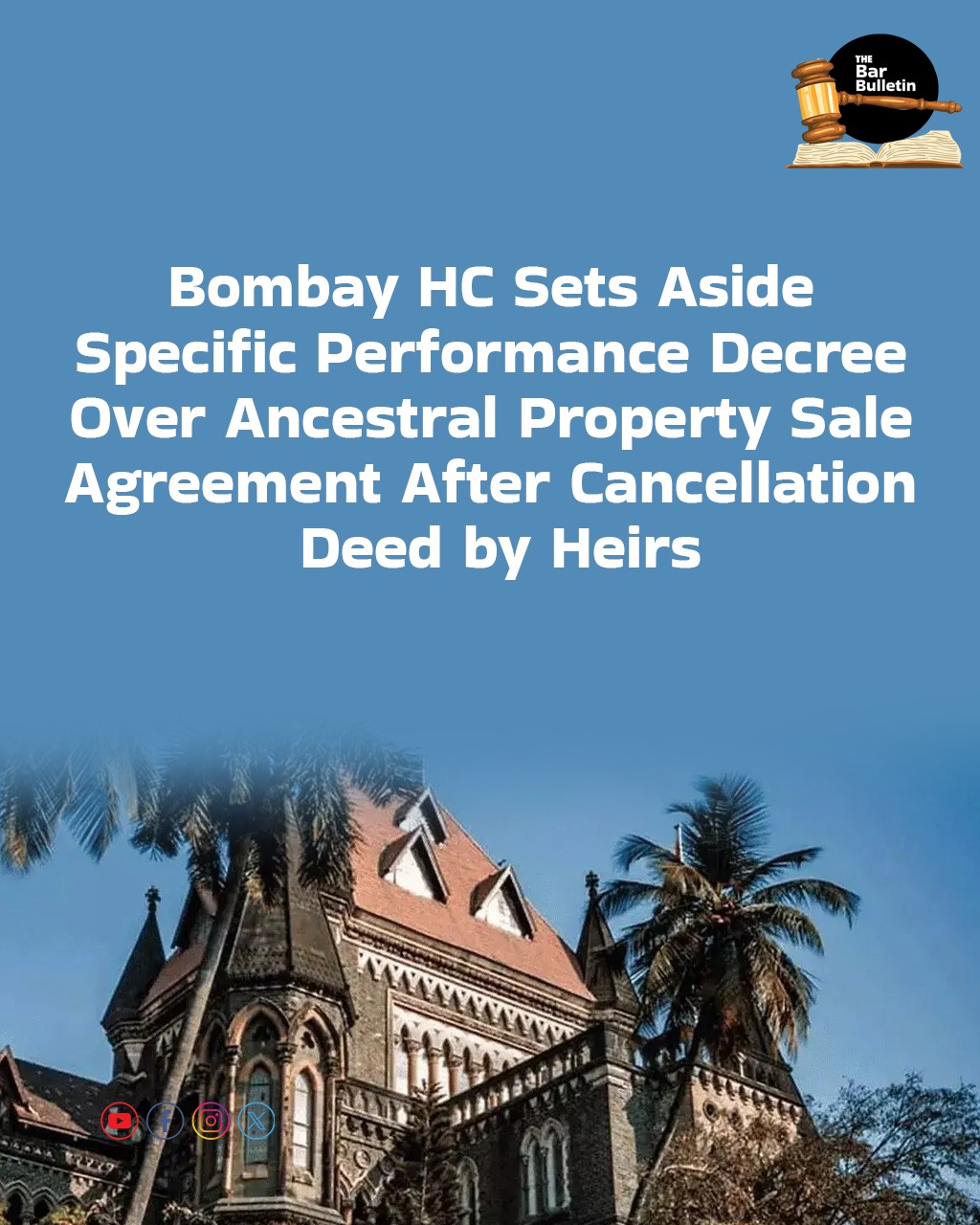The Bombay High Court allowed the second appeal, quashed and set aside the decree for specific performance granted by the first appellate court, thereby dismissing the suit for specific performance of the sale agreement.
The appellants, original defendants, challenged the decree passed by the first appellate court directing execution of a sale deed as per an agreement for sale executed on 27 May 1977. The respondents, original plaintiffs, were the heirs and legal representatives of the deceased Ankush Navale, in whose favour the agreement was executed. They sought specific performance of the agreement for sale concerning ancestral property. The appellants contended that the agreement was a security for loans and that the suit was not maintainable.
The agreement for sale dated 27 May 1977 was executed by the appellants in favour of Ankush, son of plaintiff no.1, who was deceased during pendency. The respondents (his heirs) claimed right to specific performance. The appellants argued that the agreement was a security for ongoing loan transactions with plaintiff no.1. Trial court agreed with the appellants, but first appellate court found the contract enforceable. The cancellation deed executed by heirs during the appeal challenged this enforcement.
Trial court dismissed the suit holding that the agreement was a sham executed as security for loans. The first appellate court reversed this ruling, accepted the agreement as a valid sale contract, and granted specific performance, directing the defendants to execute the sale deed. During pendency of second appeal, heirs of deceased Ankush executed and registered a cancellation deed of the suit agreement (January 2020), which was admitted as additional evidence.
The appellants argued that the suit agreement was part of loan arrangements, and not intended as sale. They contended that no authority existed to sell ancestral joint family property without consent of all co-sharers. They further submitted that the first appellate court failed to exercise discretion under Section 20, Specific Relief Act, and that the cancellation deed executed by heirs revoked their right to specific performance.
The respondents, on the other hand, contended that the cancellation deed was obtained fraudulently without consent of all parties, and was inadmissible or ineffective to revoke rights at this stage. They also maintained that the first appellate court properly appreciated pleadings and evidence to grant specific performance.
The Bench comprising Justice Gauri Godse examined the timeline and evidence, noting plaintiff no.1’s failure to give evidence and inconsistencies in proof of loan or sale. The Court highlighted that the appellate court failed to frame points on judicial discretion and familial consent under Section 20, Specific Relief Act. The Court also endorsed the principle that cancellation executed by party entitled to seek specific performance waives that right.
The Bench also observed that plaintiff no.1 (father of deceased Ankush) is not a Class-I heir and lacks standing to seek specific performance individually.
Appreciation of evidence brought out that the agreement was a security for loans rather than genuine sale intent. The cancellation deed was held valid and unaffected by Section 52, Transfer of Property Act, as it did not prejudice other parties’ rights.
In result, the Bombay High Court set aside the decree of specific performance, dismissed the suit, and upheld the trial court’s finding that the sale agreement was not intended to transfer ownership but to secure loans. The cancellation deed was held to have effectively revoked the heirs’ rights to enforce the agreement.
Cases relied on:
1. Vidyadhar vs Manikrao and Anr. (1999) 3 SCC 573
2. Man Kaur (Dead) by LRs vs Hartar Singh Sangha (2010) 10 SCC 512
3. Santosh Hazari vs Purushottam Tiwari (Deceased) by LRs (2001) 3 SCC 179
4. Sunil s/o Ramchandra Mahajan vs Sudhir s/o Gulabrao Malode 4 2023 (6) Mh.L.J 133
5. Satish Kumar vs Karan Singh and Anr. (2016) 2 MLJ 40 (SC)
6. Parakunnan Veetil Joseph’s Son Mathew vs Nedumbara Kuruvila AIR 1987 SC 2328
7. C. Arulappan vs Smt. Ahalya Naik AIR 2001 SCC 2783
8. Krishnaji Vinayak Belapurkar vs Motilal Magandas Gujarati 1928 SCC Online Bom 200
Appearances:
Mr. Amol Sakpal for Appellants.
Ms. Riddhi Gurav i/b. Mr. Ashwin Kapadnis for Respondent Nos. 3 to 4.
Mr. S.G. Deshmukh i/b. Mr. Ajit J. Kenjale a/w. Mr. Sai Rajendra Kadam for Respondent Nos. 1A to 1F.

